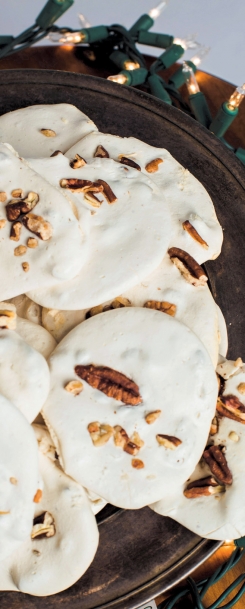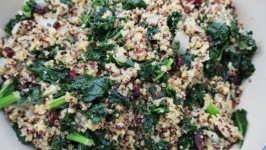In Search Of Divinity
For some people, good food—really good food—can be akin to a religious experience. They exalt at the altar of cheesy goodness, or sing the praises of sweet-tooth-satisfying confections. We even bestow certain foods with religious names. There are the obvious Angel and Devil’s Food Cakes. A little more anachronistic, Ambrosia, not inherently popular outside of the south, is named after the food eaten by Greek gods on Mount Olympus. I only recently learned about one of these sacred foods, despite its deep roots. While speaking to a local chocolatier, I nodded and pretended I knew what she meant when she said she makes “Divinity” during the holidays. Truth was, I’d never heard of the stuff.
Rushing back to my office, I promptly asked if anyone knew anything about Divinity. To my surprise, someone chimed in. “My mom used to make it every Christmas!”
Divinity kept popping up in casual conversations for the next week, most mirroring the sentiment that a loved one used to prepare Divinity at the holidays. The candy was initially described to me as a whipped, light, nougat. Not the most descriptive explanation. On the subject of Divinity, I was still fumbling in the dark, blind as Bartimaeus.
My quest for Divinity led me to a Clemson professor by the name of Alan Grubb. Here’s all he had to offer: “I know nothing about it, except I remember my sister making it and how bad it was for my teeth.” I thought it was back to the start—until I noticed another email from Dr. Grubb had slipped into my inbox.
He added, “This is what I found in John Egerton’s excellent book, Southern Food, At Home, On the Road, History. Egerton’s book is a mix of food history, recipes, and travelogue (he ate his way around the South at Mom and Pop restaurants, many or most of which have disappeared).”
Here’s what Egerton writes before giving a recipe for Divinity:
Like ambrosia and angel food, divinity belongs to the gods. Who knows where it came from or how it got here? It’s a timeless holiday candy, too rich for everyday living, too sweet for regular consumption—and too delicious for words. Recipes for it (and there is one in almost every Southern cookbook) tend to be very much alike, most of them containing only sugar, water, corn syrup, egg whites, and vanilla. This is the common method.
Grubb also states, “Recipes like these were passed from family to family, mothers to daughters, community to community.” In fact, I found out from my mother that my family has their own Divinity recipe. I decided to try my hand at Divinity.
It was at this time my mom had been digging through some family cookbooks looking for holiday recipes. She stumbled across her grandmother’s go-to cookbook, which had a recipe for Divinity in its pages. Since Divinity is about family traditions, I asked my mom if she would make Divinity with me. She was more than happy to oblige. Was it perfect? No. It ended up being too flat. Apparently, humidity can do that, and my kitchen is a humid place. Did we have a lot of fun making it? An emphatic, yes.
In my search for Divinity, I realized that the candy, which isn’t anything particularly special, is more about the tradition than the taste. Yes, I am sure there are plenty of people out there who enjoy the candy, but it was about more than that. Every person I spoke to about Divinity had one common thread in their story, and that is their memories of making it with a loved one.
And so it was for me. As I sat around a table with my family talking about cooking, we shared stories of the past. I can’t remember the last time we laughed so hard. Yes, Divinity is a candy. But, it is also holiday memories.






